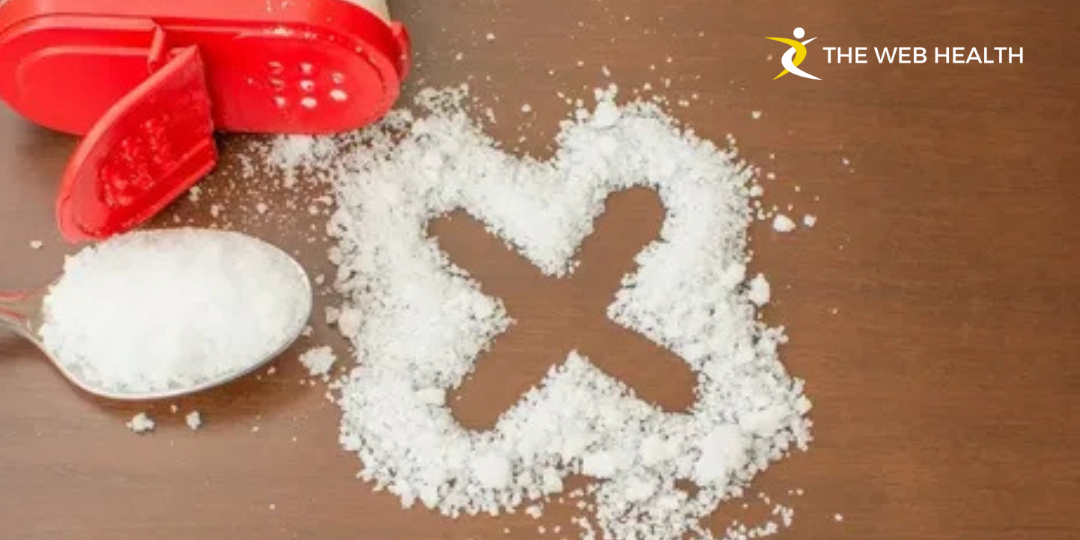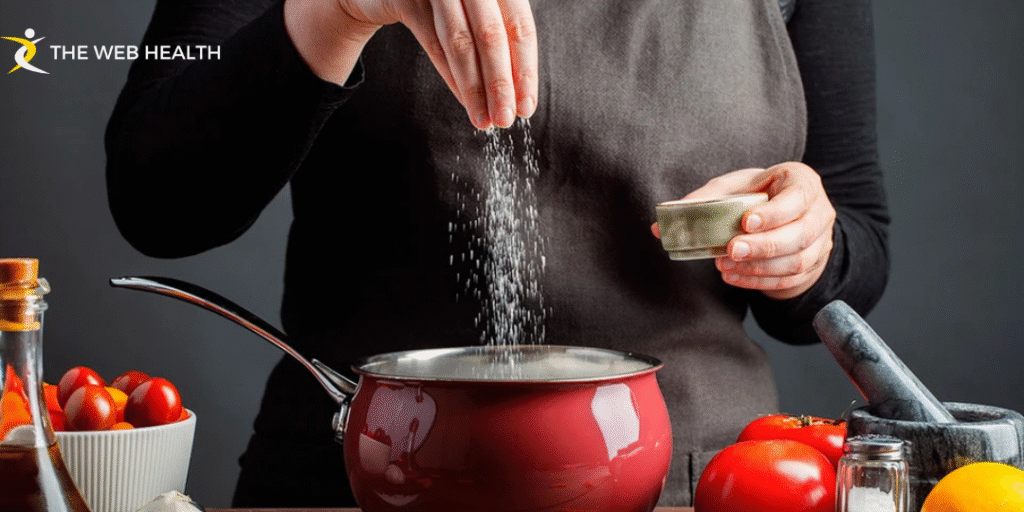Salt is a common ingredient used in daily life to add flavour to food. Salts contain 60% chloride and about 40% sodium in normal composition. Salt helps to relax and contract muscles and balance the mineral and water intake. Some salts have different compositions, like rock salt, pink salt, bamboo salt, lime salt, and fresh salt, which work differently in the body. each with unique textures, flavours, and uses. To avoid harmful effects, you should know about salt intoxication and the right amount of salt per day.
What happens if I eat too much salt
Symptoms of eating too much salt are slow but can cause severe damage, including cardiac disorders, and directly affect the body’s fluid retention. Consuming too much salt can raise blood pressure, which increases the heart’s pumping and increases the risk of heart disease and stroke.
Problems with eating too much salt:
Bloating:
Problems with eating too much salt can arise when your body starts to retain excessive water, which leads to bloating in the abdomen and thighs area. This water retention makes you feel fat, uncomfortable, and lethargic.
Thirst:
The major risk of eating too much salt is sodium metabolism imbalance. The body requires more water to dilute the sodium person consumed. To fix this, your body makes you feel very thirsty, so you drink more water. This helps balance the extra salt. If you feel thirsty all day, it could mean you’re eating too much salt.
Frequent Urination:
High sodium intake increases the workload on the kidneys. Excessive sodium and water intake leads to more frequent urination as your body tries to eliminate the excess sodium.
High Blood Pressure:
High sodium intake causes a rise in blood pressure, resulting in higher blood flow. Abnormal increases in blood pressure cause severe heart disease.
Swelling:
Excessive salt can cause abnormal increases in water retention, which causes swelling. It may be the reason behind swelling in the hands, feet, and ankles in the early morning. which can feel tender and look puffy.
Headaches:
Higher salt levels lead to vasoconstriction that increases blood pressure and blood vessel function. This leads to headaches or migraines.
Fatigue:
Eating too much salt can disrupt electrolyte balance. Symptoms show muscle fatigue and feelings of being tired and drained due to excessive fluid and nerve function.
Palpitations:
It’s important to maintain a balance of both water and salt for your heart to function normally. Sodium disrupts electrolyte balance and puts extra pressure on your heart. As a result, your heart might beat irregularly or more forcefully, leading to palpitations.
GERD:
Excessive salt intake may increase symptoms of gastro-oesophageal reflux disease (GERD). where stomach acid flows back into the oesophagus, which leads to heartburn and discomfort at night.
How to lower the risk of salt intoxication?
Signs of eating too much salt can be referred to as ‘salt intoxication‘ or ‘hypernatremia.’ This is an alarming condition of sodium accumulation in the body. alarming if not treated carefully. The risks can be managed by a proper diet plan and modification of your lifestyle.
Cut down salt:
Start following healthy measures and avoid processed and packaged foods, which often contain high levels of salt. Shift to a high-fibre diet and whole foods like fruits, vegetables, and proteins. Avoid canned drinks and frozen items that have excessive salt.
Drink Plenty of Water:
A good level of hydration helps your body balance sodium levels. Drink water throughout the day to flush out excess sodium from the body. If you’ve consumed salty foods, keep yourself active through normal movements.
Exercise Regularly:
Regular physical activity can help maintain water-sodium balance in the body. A healthy blood pressure helps in reducing the risks associated with too much salt.
Monitor Blood Pressure:
High blood pressure can be a major cause of heart disease and stroke. Keep track of your blood pressure regularly to spot early signs of complications.
Use remedies.
Different variants of salts, like bamboo salt, lime salt, rock salt, and Himalayan salt, can be used to add flavor to food. These salts have traces of magnesium and minerals to keep you full. There can be better alternatives to get more benefits without spending more.
Benefits of eating less salt
Sodium is necessary for bodily functions but harmful in excess. Reducing your salt intake has positive effect on your health. Cutting back on salt can help prevent or improve many of the health issues that effect your health. Let’s take a look at the benefits of eating less salt.
Improved Heart Health:
Excessive salt can increase blood pressure, which strains your heart and blood vessels. By cutting down on sodium, you can help reduce your risk of high blood pressure.
Reduces Bloating:
Eating too much salt causes water retention, which can lead to swelling in your body. Eating less salt can lead to the release of extra salt deposits in the body.
Protects Kidney Function:
Problems with eating too much salt affect the body from the heart to the kidneys. Your kidneys filter out waste and excess fluid salt intoxication. Cutting down on excessive salt reduces the risk of kidney disease or kidney stones.
Improves Bone Strength
Eating too much salt causes excessive urination that may result in flushing out essential minerals in the body. Prolonged excessive salt intake can cause your body to lose calcium through urine, which may weaken bones over time.
How to flush sodium out of your system:

Use Remedies:
Natural mechanisms to flush out sodium through urination and sweating can be hastened by using different remedies. Use remedies to reduce use of salt. Sift to pink salt, then regular. Add a pinch of pink salt to a glass of lemon water and drink once a day to flush out excessive sodium.
Hydration:
Kidneys help to flush out sodium through your urine. Drinking lots of water gives them the support they need to wash that salt away faster. So, keep sipping water throughout the day.
Eat potassium-rich food:
Potassium helps balance out the sodium in the body. Potassium-rich foods like bananas, oranges, and avocados can help bring that balance back and reduce the effects of too much salt.
Final Thoughts:
Salt is an essential part of food, but eating too much salt can cause severe problems related to the heart, kidneys, and blood pressure and even cause strokes. That’s why experts only recommend 5 grams of salt per day. Natural salts like pink salt and lime salt contain trace minerals that can reduce sodium level in the body. But it should be used wisely. Drink plenty of water, use potassium-enriched fruits and veggies. Stay active and exercise daily to lower risks of eating too much salt.
FAQs:
Can eating too much salt cause dry mouth?
Eating too much salt can cause severe dehydration because of excessive water loss through urination. Excessive salt can change the saliva electrolyte balance, which makes you thirstier.
Can eating too much salt cause headaches?
Excessive salt causes blood pressure to rise, which exerts pressure on blood vessels. Throbbing pain can be caused by vasoconstriction or excessive salt intake.
Does eating too much salt kill you?
Excessive intake of salt can cause serious heart issues that could be life-threatening. It’s a long-term mechanism; no one can die due to just a single salty meal.



